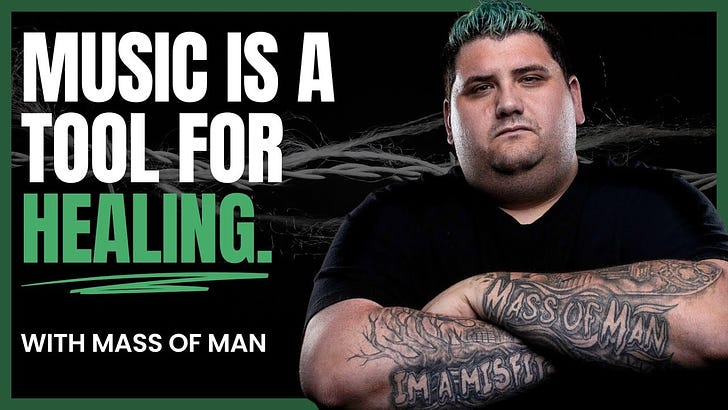In my recent interview with Nico DeGiacomo, better known by his stage name, Mass of Man, we explored the deeply personal role music has played in his life. Known for his emotional hip-hop that tackles heavy themes like mental health, depression, and bullying, Mass of Man opened up about how music has not only been a creative outlet but a powerful tool for healing.
Mass of Man’s journey began with a spark of curiosity and rebellion. His brother's forbidden cassette tapes introduced him to rap, and later, artists like Eminem would inspire him to express himself through music.
By the time he reached high school, Nico was captivated by the art of rhyme and began creating his own music with the most basic equipment. It quickly became his refuge, a way to channel the pain he experienced from relentless bullying over his weight and appearance.
During our conversation, he shared his experiences as an outsider in school. Despite his towering size—he stands at 6'6"—Nico described himself as gentle and introverted, characteristics that, instead of protecting him, seemed to invite more ridicule. He endured daily verbal abuse and social exclusion, which left scars but also fueled his creative drive. These difficult years of bullying and isolation became the foundation of much of his music, giving voice to the pain that many of his fans relate to today.
One of his most impactful songs, “Fallen Angel,” dives into his struggles with depression. He explained that the song, structured as a conversation with his inner demons, has resonated deeply with his audience. The messages he receives from fans often reveal how his music has helped them feel understood during their darkest moments.
This feedback, he shared, is a powerful reminder that sad music doesn't necessarily have to "cure" depression; instead, it can offer comfort and solidarity by validating a person’s emotions. He finds it moving to know his work has reached people at a time when they needed it most.
Our discussion also touched on the delicate balance between authenticity and artistic branding. Nico admits that, though he’s in a better mental space than in the past, his audience still gravitates towards his emotionally raw music. This paradox of needing to revisit painful themes to maintain artistic honesty—and connect with fans—while also moving forward personally is something he’s learning to navigate.
Beyond personal healing, Nico’s story also highlights the broader potential of music as a means for connection and self-empowerment. For Mass of Man, music is more than just an art form; it’s a source of strength and transformation.
He emphasizes that anyone pursuing a creative path should do so out of genuine passion, not for fame or validation. His journey is proof that even the heaviest burdens can be lifted, shared, and transformed through art, turning pain into something powerful and meaningful. Interviewing Mass of Man was a reminder of the profound impact that music can have on both artists and their audiences.
Nico’s resilience, honesty, and dedication to his craft illustrate the transformative power of music—a medium that doesn’t just entertain but heals, connects, and uplifts.



